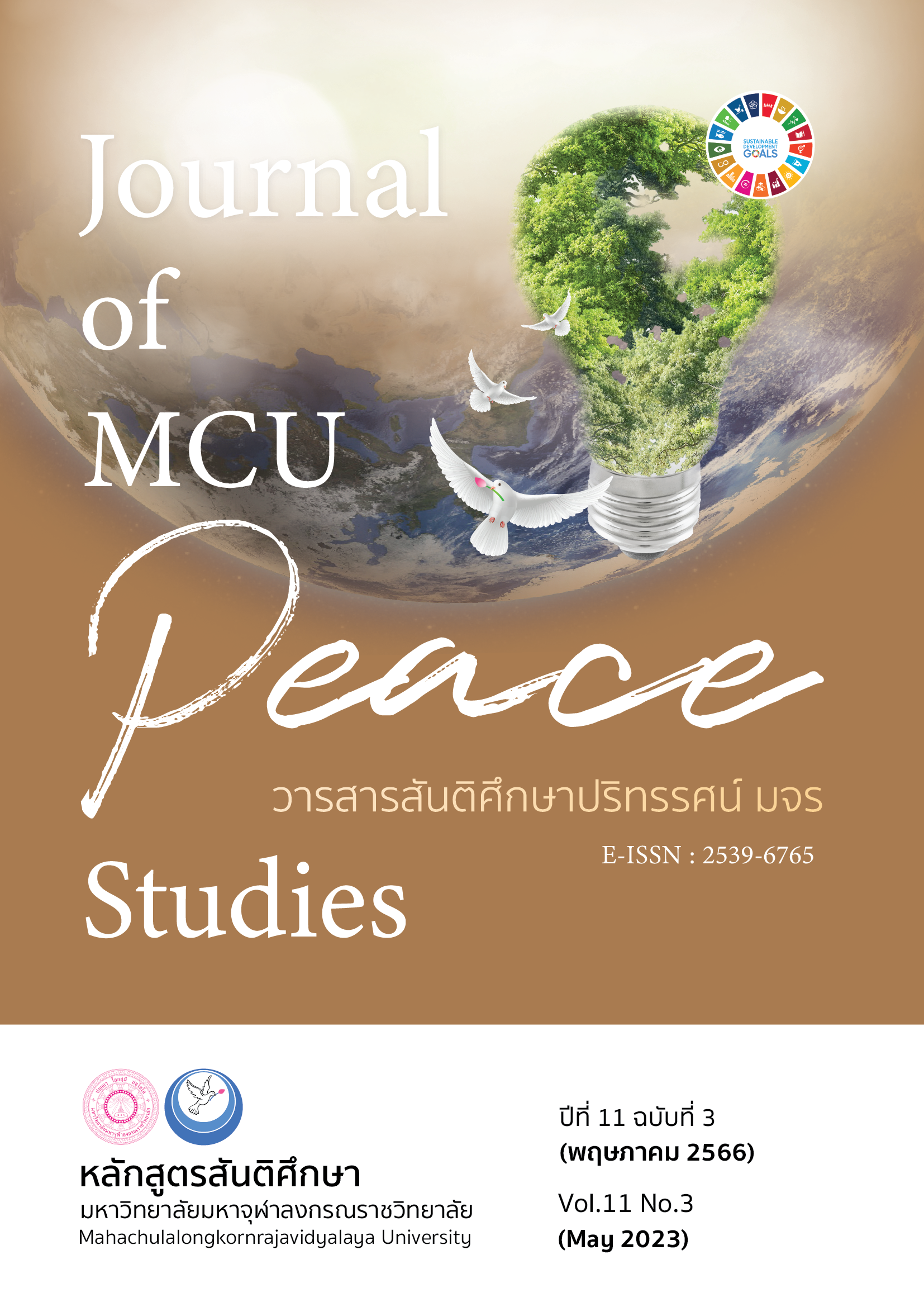พุทธธรรมาภิบาลกับการบริหารจัดการทางการเมืองในสังคมไทย
Main Article Content
บทคัดย่อ
บทความวิชาการนี้มุ่งศึกษา พุทธธรรมาภิบาลกับการบริหารจัดการทางการเมืองในสังคมไทย พบว่า การบริหารจัดการทางการเมืองที่มีการรัฐประหารเมื่อวันที่ 22 พฤษภาคม 2557 ถึงปัจจุบัน ส่งผลกระทบต่อการบริหารประเทศไทยอย่างมาก เช่น ก่อให้เกิดผลกระทบทางเศรษฐกิจ ผลกระทบทางการเมือง และการเป็นอยู่ของประชาชน บริบททางการเมืองกลายเป็นรัฐประหารที่ยังวนเวียนอยู่ในสังคมไทย เนื่องจากสาเหตุความขัดแย้งมาจากการแก่งแย่งอำนาจและผลประโยชน์ระหว่าง 2 ฝ่าย คือ ฝ่ายราชการกับฝ่ายนักการเมือง ผู้ที่แย่งอำนาจมาครอบครองได้จะใช้อำนาจเพื่อจัดสรรผลประโยชน์และทรัพยากรให้แก่ตนและพวกพ้อง ดำรงอุดมการณ์ที่ผิดหลักการบริหารประเทศ จึงทำให้การบริหารจัดการทางการเมืองขาดเสถียรภาพทางการปกครอง เนื่องจากการขาดหลักการบริหารจัดการที่ดี คือ การขาดหลักธรรมาภิบาล เช่น (1) ขาดหลักนิติธรรม คือ การมีระเบียบและข้อบังคับชัดเจน (2) ขาดหลักธรรม คือ ดำเนินงานไม่เป็นธรรม ไม่อยู่บนพื้นฐานของศีลธรรมและจริยธรรม (3) ขาดหลักความโปร่งใส คือ การบริหารจัดการไม่เปิดเผยต่อสาธารณชน (4) ขาดหลักการมีส่วนร่วม คือ ไม่เปิดโอกาสให้ประชาชนและองค์กรที่เกี่ยวข้องมีส่วนร่วมในการตัดสินใจ (5) ขาดหลักความรับผิดชอบ คือ ปฏิบัติงานไม่เต็มความสามารถและไม่รับผิดชอบต่อผลการปฏิบัติงานอย่างเต็มที่ และ (6) ขาดหลักความคุ้มค่า คือ การบริหารจัดการต้องใช้ทรัพยากรที่ไม่จำกัด ไม่มีประสิทธิภาพ ไม่ก่อให้เกิดประสิทธิผลคุ้มค่าแก่ส่วนรวม
Article Details

อนุญาตภายใต้เงื่อนไข Creative Commons Attribution-NonCommercial-NoDerivatives 4.0 International License.
ทัศนะและความคิดเห็นที่ปรากฏในบทความในวารสาร ถือเป็นความรับผิดชอบของผู้เขียนบทความนั้น และไม่ถือเป็นทัศนะและความรับผิดชอบของกองบรรณาธิการ ยินยอมว่าบทความเป็นลิขสิทธิ์ของวารสาร
เอกสารอ้างอิง
Bamrungsuk, S. (2015). Sena Thipattai: The Coup and Thai Politics. Bangkok: Matichon.
Chaovaluksakul, S., & Prachayakul, Y. (2018). Coups and Thai Politics. Journal of Business Administration and Social Sciences Ramkhamhaeng University. 1(3), 17-34.
Chapman, E.N. (1995). Supervisor Survival Kit. (2nd ed.). California: Science Research Associates Inc.
Covey, F. (1999). The Four Roles Leadership. USA: Franklin Covey.
Eawsriwong, N. (2006). Thai Politics in the Reign of King Narai. Bangkok: Matichon.
Intasena, N., & Srima, K. (2017). Factors Influencing the Achievement in the Performance of the Officers of Buddhism Office 17 Northern Provinces of Thailand. Ganesha Journal, 13(1), 163-175.
Kaewkoon, S. (2018). Modern Organization Management with Modern Management. Mahachula Academic Journal, 5(Special Edition), 197-208.
Kaewponthong, J., Chotikavatchagul, S., Klaydesh, P., & Phra Soontorn Chamkorm, (2018). Community Management for Sustainability. Dhammathas Academic Journal, 18(1), 263-273.
Khongkhun, M. (2008). School Administration Behavior According to the Principles of Good Governance of the School Director under Pattaya City. (Master’s Thesis). Burapha University. Chon Buri.
Kitjarak, T. (1999). Educational Administration Teaching Documents. Phetchabun: Faculty of Education, Phetchabun Rajabhat Institute.
Maneerattanalerdvanid, S., & Mungmeesup, N. (2019). Administrators’ Emotional Intelligence Affecting Effectiveness of Communication in School under Office of Ratchaburi Educational Service Area 1. Journal of Social Science Research, 10(2), 99-112.
Office of the Civil Service Commission. (2001). Handbook on Building a Good Governance System for Public Affairs and Society According to the Rules of the Prime Minister's Office on Building a Good Management System for City and Society. Bangkok: Civil Service Office.
Phanngam, P. (2018). Administration According to Good Governance of the Wang Sai Sub-district, Administrative Organization Wang Neur District, Lampang Province. Mahamakut Graduate School Journal, 16(1), 229-247.
Phokanit, K. (2019). Application of Sufficiency Economy Philosophy to the Management of Organic Agricultural Community Enterprise in Chaiyaphum Province. Academic and Research journal Northeastern University, 9(1), 50-56.
Pholwattana, L. (2014). Good Governance for University Administration. Journal of Educational Administration Burapha University, 8(2), 16-27.
Phothikun, A. (2017). Good Governance of Local Administrative Organization, Amphor Mueng, Samutsakorn Province. Journal of Management Science Nakhon Pathom Rajabhat University, 4(1), 97-109.
Phra Dhammapitaka (P.A. Payutto). (2012). Buddhism in ASEAN. (6th ed.) Printing. Bangkok: Thammasapha Printing House.
Phra Thammakosajarn (Prayoon Thammachitto). (2006). Buddhist Method of Administration. Bangkok: Mahachulalongkornrajavidyalaya Printing House.
Phrakhru Opasonthakit (Sakda Saengthong), & Sajja, K. (2014). Leadership in the 21st Century in Buddhist Perspective. Journal of Educational Review Faculty of Educational in MCU, 1(2), 135-144.
Phrakhru Ophassarathikhun (Chatree Asapho) et al. (2021). The Buddhist Good Governance and Philosophy of Moderate Postmodernism. Journal of MCU Peace Studies, 9(4), 1444-1454.
Phrakhrupalad Prawit Warathummo et al. (2021). The Acceptation of Good Governance Principles to Public Management. Journal of MCU Nakhondhat, 8(4), 35-47.
Phramaha Paitoon Pantanonto. (2007). Administration Thai Sangha. Bangkok:Sripatum University.
Phuphaiboon, S. (1999). Organization and Management. (2nd ed). Bangkok: Font Protection.
Posri, B., & Chantuk, Y. (2016). Managementto Emphasize to Produce of School to Professional Labor in Vocational. Veridian E-Journal, Silpakorn University, 9(2), 216-229.
Prime Minister's Office (1999). Regulations of the Office of the Prime Minister on the Construction of a Good Public and Social Affairs Administration, 1999. Bangkok: Cabinet Press and the Government Gazette.
Rattraikaew, T. (2006). Assessment of Management According to the Principles of Good Governance of Schools in Nakhon Sawan Province. (Master’s Thesis). Nakhon Sawan Rajabhat University. Nakhon Sawan.
Royal Irrigation Department. (2013). Good Governance and Irrigation Management in Perspectives of Service Providers, Fiscal Year 2013. Bangkok: Policy Analysis Group, Planning Division, Royal Irrigation Department.
Saengnimnuan, S. (2009). Leadership and Good Governance in the Administration of Local Government Organizations. Nonthaburi: King Prajadhipok's Institute.
Teepirat, C. (2002). Various Perspectives, Experiences, Development Documents for Civil Servants. Bangkok: King Prajadhipok's Institute.
Thongin, T. (2004). Basic Knowledge of Public Administration. Bangkok: Mahachulalongkornrajavidyalaya University.
Wattanachai, K. (2003). Good Governance and Roles of the Basic Education Institutions Committee. Office of the National Education Commission. Bangkok: Fine Print.


